TMJ Therapy
What is TMJ and TMD?
TMJ is the short name for the temporomandibular joint, or jaw joint. We all have two of these joints, a right and a left. The TMJ is a ball-and-socket, composed of the condyle of the mandible (the ball) sitting in the Glenoid fossa of the temporal bone of the cranium (the socket), with a cartilage disc maintained between these two bones for joint stability and health. Balance of the muscles and ligaments that surround and support this system is essential to maintenance of joint health.
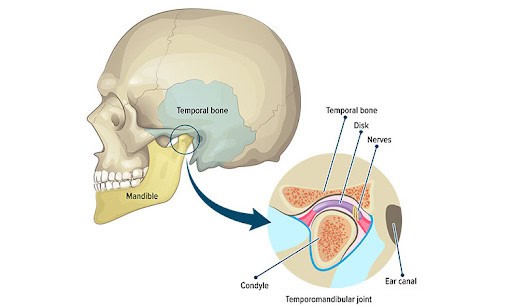
Healthy functioning joints are painless and asymptomatic. Once in a while, it can be normal to feel your jaw pop, to hear some jaw clicks, or to feel some discomfort in your head/neck/shoulders after a long day.
Experiencing these symptoms frequently, however, indicates joint dysfunction. TMJ dysfunction occurs with chronic imbalance in muscle activity that can result in dislocation of the disc from its stable position between the bones. Conditions related to an unstable joint are collectively referred to as TMD, or temporomandibular joint disorder.
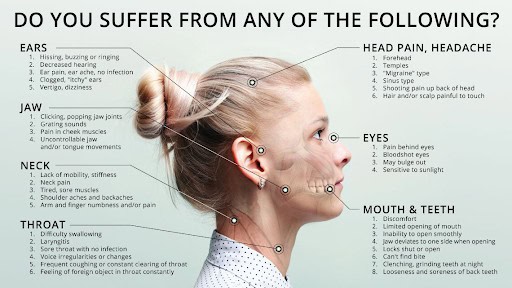
Symptoms of TMD
- Pain in face or jaws
- Chewing discomfort
- Inability to fully and comfortably open mouth
- Neck, shoulder, upper back pain
- Clicking or popping noises with opening and/or closing
- Chronic headaches or migraines
- “Stuffy” ears
- Ringing in the ears
- Dizziness or vertigo
- Feeling of “something stuck in my throat”
- Generalized tooth sensitivity
Consequences of TMD
- Inability to control increased pain with face or jaws
- Loss of ability to effectively chew
- Inability to open mouth
- Full dislocation of the disc (with no further clicking/popping)
- Inability to control increased headaches/migraines
- Inability to control increased pain with neck, shoulders, upper back
- Anxiety from chronic pain
- Severe wear and fracture of teeth
- Unidentified sleep apnea or other sleep breathing disorders, as TMD is closely related
- Autonomic nervous system dysfunction, with sympathetic overdrive due to chronic pain and sleep disorder
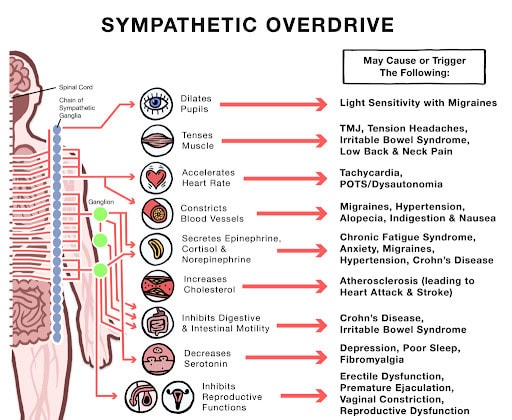
What causes TMD and Craniofacial Pain?
TMJ dysfunction and its associated pain can be caused by acute trauma, such as a car accident or a blow to the face. More commonly, TMD is caused by chronic trauma such as joint compression from a bad bite, clenching/grinding the teeth during sleep, fascial tension from a tongue tie, and/or chronic inflammation from systemic stressors. TMD is very often correlated with sleep disordered breathing, so we must consider improvement of the airway in any treatment of TMJ disorder.
Imbalances of the oral and facial muscles and soft tissues are at the root of most TMJ disorders. Soft tissue balance is a critical component to a healthy and stable TMJ. Resting with the tongue pressed in the palate serves to very effectively stabilize the mandible, and thus the joint associated with it. The importance of this balance begins in infancy, as our jaws develop according the forces of the muscles and soft tissues surrounding them. Proper resting mouth posture, with the mouth closed, lips sealed, and tongue resting in palate, is essential for proper development of the jaws.
Insufficient development of the jaws is commonly associated with TMJ compression, leading to TMJ disorder. When the maxilla, or upper jaw, does not develop sufficiently forward or laterally, the mandible, or lower jaw, can get trapped behind it. If the mandible cannot grow forward, the result is backward compression of its joint with the temporal bone. A compressed joint is an unstable and often painful joint. This video is a great illustration of the common progression of TMJ dysfunction, and its relation to breathing, airway, jaw development, and soft tissue balance.
How is TMD and Craniofacial Pain Treated?
Successful treatment of TMD is dependent upon a full diagnostic work up to appropriately determine the root cause of the dysfunction and the severity of the disorder. This includes a thorough physical examination with 3D CBCT imaging of the jaws, the joints, and the airway, along with assessment of associated muscles and function.
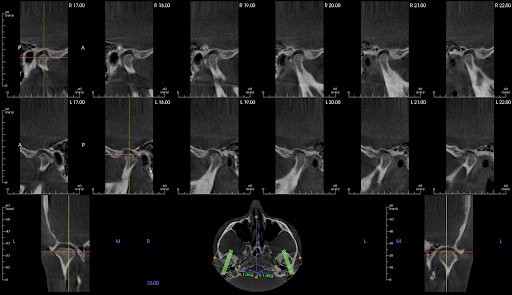
TMD Services
TMD and craniofacial pain services may include 1 or more of the following:
- Comprehensive diagnostic assessment
- 3D CBCT imaging
- Referral for sleep study to identify type and severity of sleep disordered breathing
- Therapy with a decompression appliance (a custom orthotic device to relieve symptoms, prior to treatment of the root cause)
- Customized therapy with a day and nighttime splint to maintain the jaws in a decompressed joint position
- Jaw development with orthodontic treatment to expand the teeth into a bite coordinated with a stable TMJ position
- Release of a contributory tongue tie, along with oral myofunctional therapy to correct oral posture and function
- Strategic Botox injections of problematic muscles
- Nutritional counseling
- Referral coordination with integrated providers, such as ENT, functional medicine, craniosacral therapist, physical therapist, certified breathing practitioner, etc.
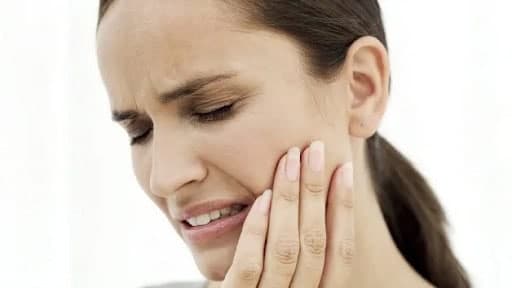
Facial pain, jaw problems, and headaches are frequently only a symptom of a much greater problem that affects on the whole body, much like a fever is a symptom secondary to the flu.
It is very important to recognize that our body is an integrated system, and many factors can contribute to craniofacial pain. While the TMJ is very often the main contributor in craniofacial pain, we also need to consider potential contributions of autoimmune disease, hormonal issues, nutritional deficiencies, myofascial tension, breathing disorders, etc, and to work together with specialists in these fields to address all roots of the problem.
The first step in treatment will be an in depth consultation appointment with Dr. Mindy. This will include a comprehensive physical head and neck evaluation, 3D CBCT imaging with full TMJ and airway assessment, investigation of correlating health conditions, and discussion of treatment options and recommendations.

